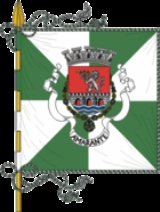
Amarante
Encyclopedia
Amarante is a municipality in Porto District
, in northern Portugal
. It has a population of 61,029 and a total area of 301.5 km². It contains the city of Amarante
.
The municipality is composed of 40 parishes. It is home to the S. Gonçalo's Monastery and by its centenary bridge.
. However, it increased of importance only after the arrival of Saints Gonçalo of Amarante, in the 12th century. The construction of the stone bridge across the Tâmega
river is credited to him.
After his death, Amarante became the destination of pilgrimages and grew substantially. In the 16th century, King John III of Portugal
had the church of St. Mary turned into a large Dominican monastery near the bridge of St. Gonçalo. The bridge was destroyed by a flood in 1763 and was rebuilt.
During the Napoleonic invasion of Portugal
, the bridge of Amarante was the seat of an episode of Portuguese resistance against the French troops led by general Henri-François Delaborde. The city was set to fire by the French, and was later rebuilt.
Porto District
The District of Porto , sometimes Oporto in English, is located on the north-west coast of Portugal. The district capital is the city of Porto, the second largest city in the country...
, in northern Portugal
Portugal
Portugal , officially the Portuguese Republic is a country situated in southwestern Europe on the Iberian Peninsula. Portugal is the westernmost country of Europe, and is bordered by the Atlantic Ocean to the West and South and by Spain to the North and East. The Atlantic archipelagos of the...
. It has a population of 61,029 and a total area of 301.5 km². It contains the city of Amarante
Amarante, Portugal
Amarante is a city in Amarante Municipality, Portugal.The city itself has a population of 11,261 inhabitants. It sits on the banks of the Tâmega River.It is a sister city of Wiesloch, Germany.- Culture :...
.
The municipality is composed of 40 parishes. It is home to the S. Gonçalo's Monastery and by its centenary bridge.
History
Amarante originated from the prehistoric tribes who inhabited the Serra da Aboboreira as early as the Stone AgeStone Age
The Stone Age is a broad prehistoric period, lasting about 2.5 million years , during which humans and their predecessor species in the genus Homo, as well as the earlier partly contemporary genera Australopithecus and Paranthropus, widely used exclusively stone as their hard material in the...
. However, it increased of importance only after the arrival of Saints Gonçalo of Amarante, in the 12th century. The construction of the stone bridge across the Tâmega
Tâmega
The Tâmega or Támega is an international river belonging to Spain and Portugal. The river begins its course near Verín, Galicia flowing south to Portugal, in the historical provinces of Trás-os-Montes and Douro Litoral....
river is credited to him.
After his death, Amarante became the destination of pilgrimages and grew substantially. In the 16th century, King John III of Portugal
John III of Portugal
John III , nicknamed o Piedoso , was the fifteenth King of Portugal and the Algarves. He was the son of King Manuel I and Maria of Aragon, the third daughter of King Ferdinand II of Aragon and Queen Isabella I of Castile...
had the church of St. Mary turned into a large Dominican monastery near the bridge of St. Gonçalo. The bridge was destroyed by a flood in 1763 and was rebuilt.
During the Napoleonic invasion of Portugal
Napoleonic Wars
The Napoleonic Wars were a series of wars declared against Napoleon's French Empire by opposing coalitions that ran from 1803 to 1815. As a continuation of the wars sparked by the French Revolution of 1789, they revolutionised European armies and played out on an unprecedented scale, mainly due to...
, the bridge of Amarante was the seat of an episode of Portuguese resistance against the French troops led by general Henri-François Delaborde. The city was set to fire by the French, and was later rebuilt.
Parishes
|
Santiago de Figueiró Santiago de Figueiró is a parish in the municipality of Amarante in Portugal.... São Simão de Gouveia São Simão de Gouveia, or simply São Simão, is a parish in the municipality of Amarante in Portugal. It covers an area of 12.79 km² and had a population of 740 as of 2001... |

